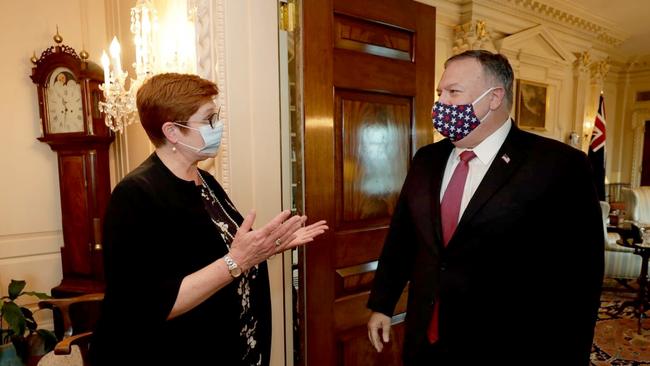Beijing calls Australia dog barking at China at US behest
Nationalist Global Times hit out at Marise Payne for saying Australia had no intention of hurting its relationship with China.

China’s Global Times has accused Australia of being like a dog “barking at China” at the behest of America.
“Tied to the US, Australia is barking at China,” the Global Times said in an editorial commenting on the annual AUSMIN talks between Australia and the US in Washington this week.
At the same time, it says, Australia was also “looking for benefits from China.”
The Times, a Communist Party publication known for its outspoken nationalism, hit out at comments made by Foreign Minister Marise Payne in Washington when she said that Australia had no intention of hurting its relationship with China.
“Payne stressed the country (Australia) had no intention of hurting its relationship with China,” the Global Times said.
“It sounds so hypocritical.
“Australia has always been at the forefront of US containment against China, completely following the US lead,” it said.
“It will bite China as long as the US tells it to.
“Payne’s remarks sound like telling China: ‘The US told me to bite you.
“’I have no choice. But this should not hurt our relationship’.”
The Global Times said the Morrison Government was “trying hard to show its loyalty to Washington” by sending Payne and its Minister for Defence, Linda Reynolds, to Washington for the talks, despite the fact that they would have to quarantine for two weeks when they arrived back in Australia.
Its strong comments on the AUSMIN talks come as China’s Ministry of Foreign Ministry made a more measured response.
“China has noted the consultations between the Australian Ministers for Foreign Affairs and Defence and the US Secretaries of State and Defence,” Ministry of Foreign Affairs spokesman Wang Wenbin told the MFA press conference in Beijing on Wednesday.
“For a while, the US and Australia have been highlighting and hyping up the so called China threat and smearing China on a series of issues,” he said.
“China deplores and firmly rejects that.”
“We have lodged solemn representations with the two countries respectively.
“We urge the US and Australia to form a correct perception of China, stop interfering in China’s internal affairs or damaging Chinese interests, and create enabling conditions to develop bi lateral relations with China.
“We also urge them to play a constructive role in upholding peace, stability and development in the region, instead of doing the opposite.”
The comments come as Michael Clifton, the chief executive of China think tank, China Matters, and a former head of Austrade in China, said this week that Australia’s relations with China were in a “deep freeze.”
“We are definitely in the diplomatic deep freeze,” he said.
But he said that Australia needed to “keep trying” to maintain its ties with China through both formal diplomatic and business ties and back channels.
In a report issued this week, he said many leading Australian business people were too afraid to speak out about their concerns about the relationship with China for being “slapped down” and having their motives impugned.
The report argues that the business community should be prepared to be more publicly proactive in discussing the importance of Australia’s ties with China.
It calls for the establishment of a national advisory committee on China, made up of business people, former diplomats and others with China experience to advise the Prime Minister.
It also calls for the resumption of annual meetings between Australian and Chinese business leaders, which would be held regardless of whether there were meetings between the political leaders of each country.
The last visit to Australia by a Chinese political leader was made by Chinese premier Li Keqiang in March 2017.
The China Matters report says: “Australian business leaders have been overly cautious in their response to the crisis in Australia’s relationship with China.
“Amid a rising tide of hostility towards China, they are largely silent, or their words are being drowned out by louder voices.”
At the AUSMIN talks in Washington this week Australia agreed to step up its naval exercises with the US and for closer co operation on military issues in the region.
But Foreign Minister Payne said that Australia’s relationship with China was “very important.”
“We have no intention of injuring it,” she said.
“We make our own decisions, our own judgments in the Australian national interest about upholding our security, our prosperity and our values.”



